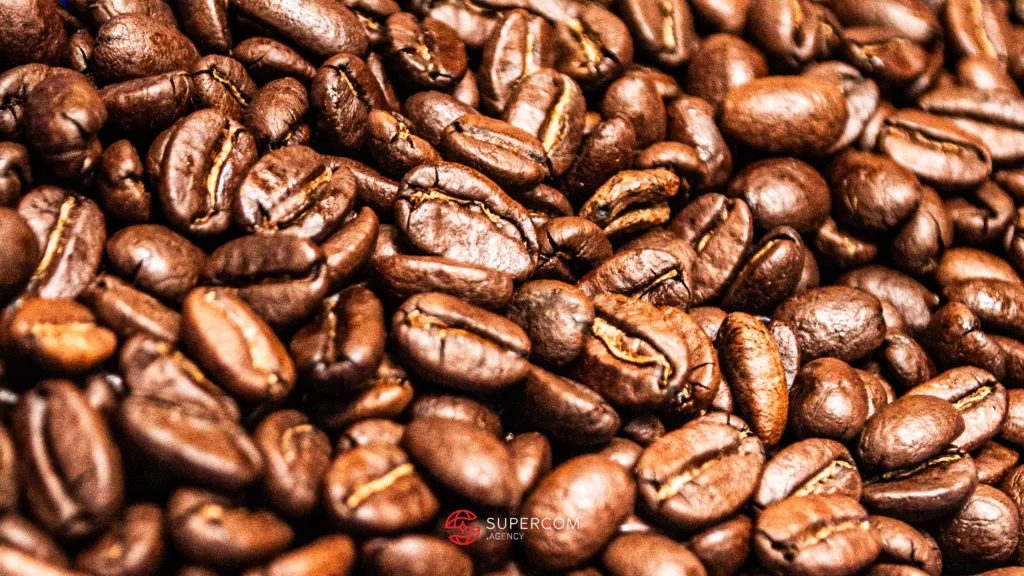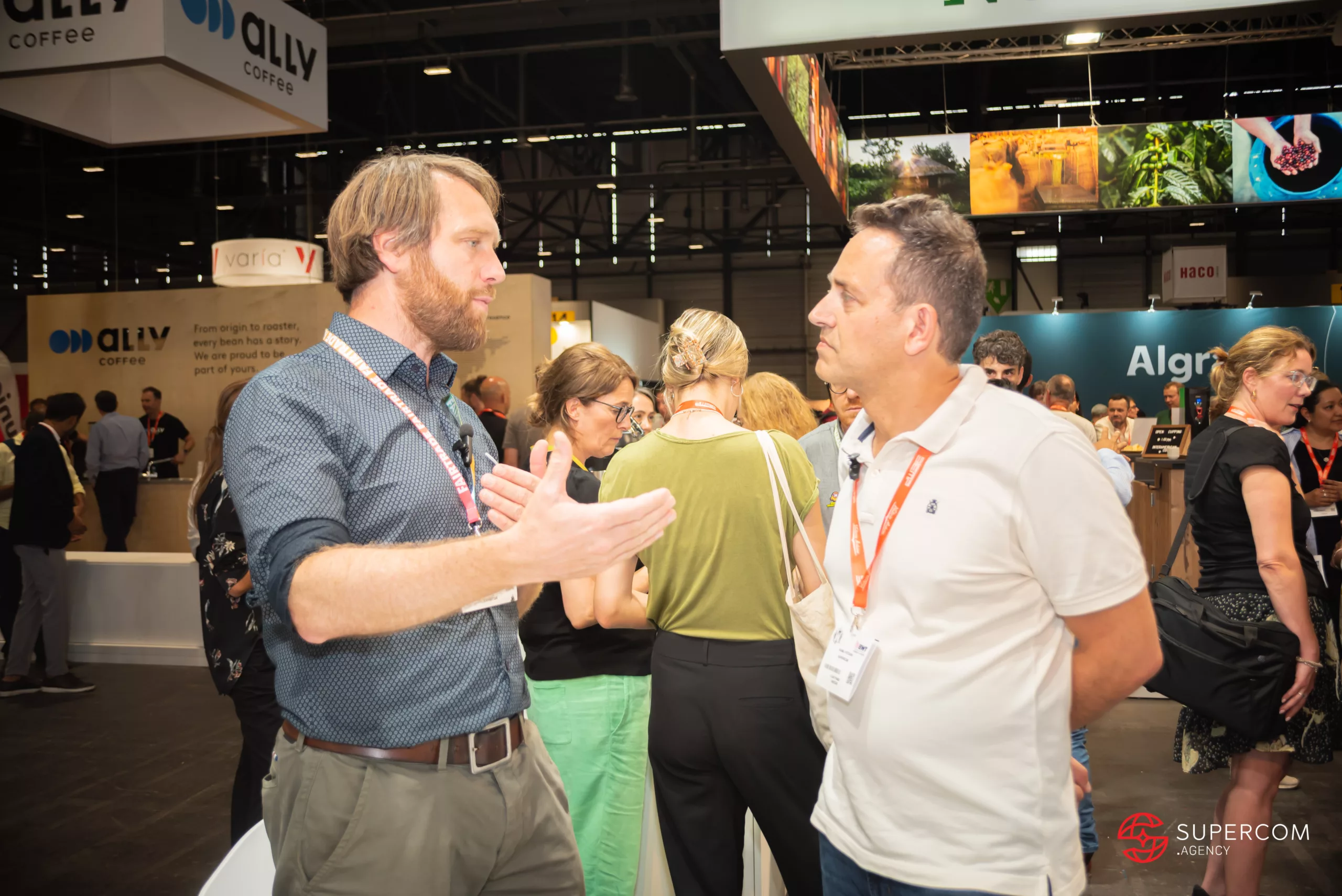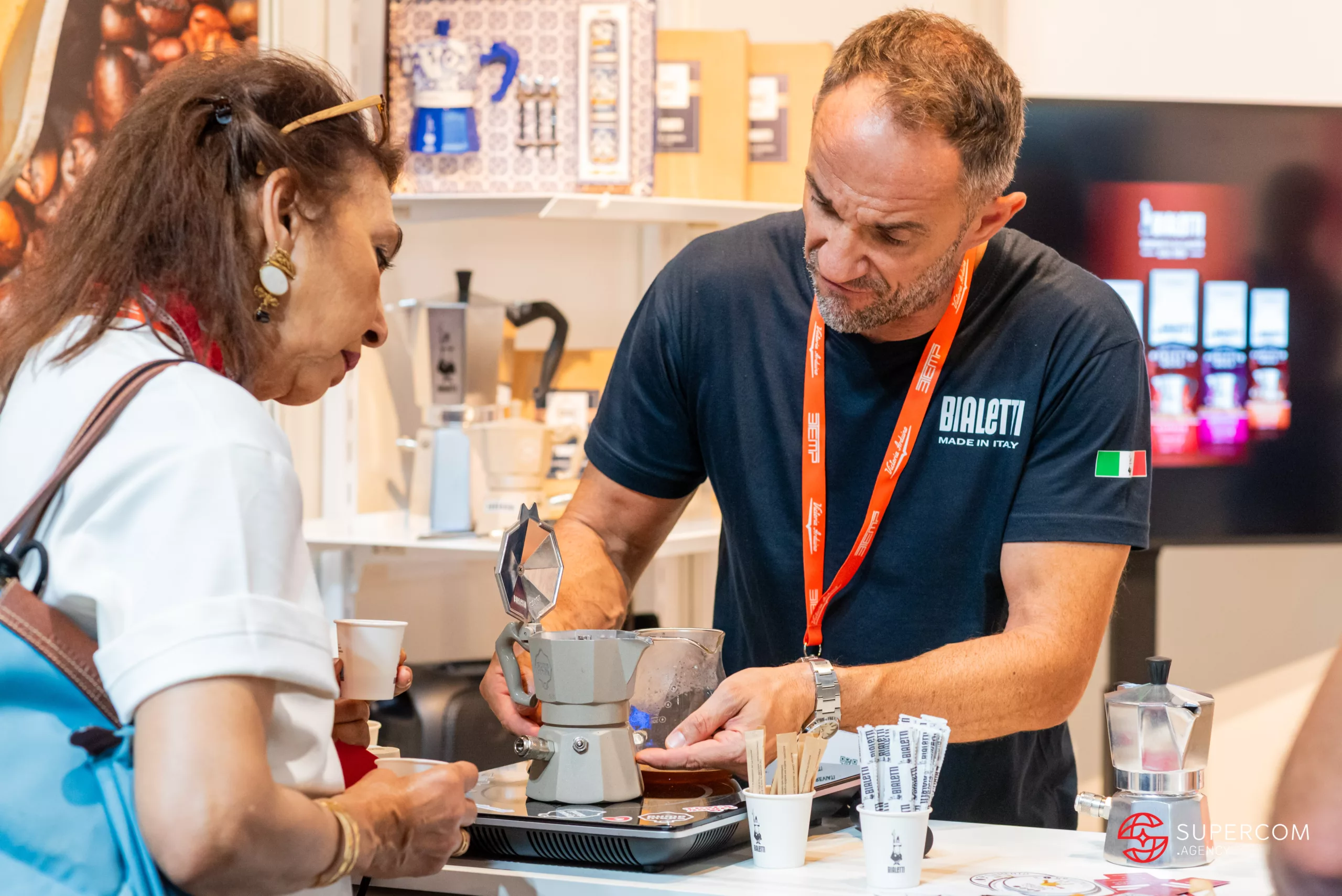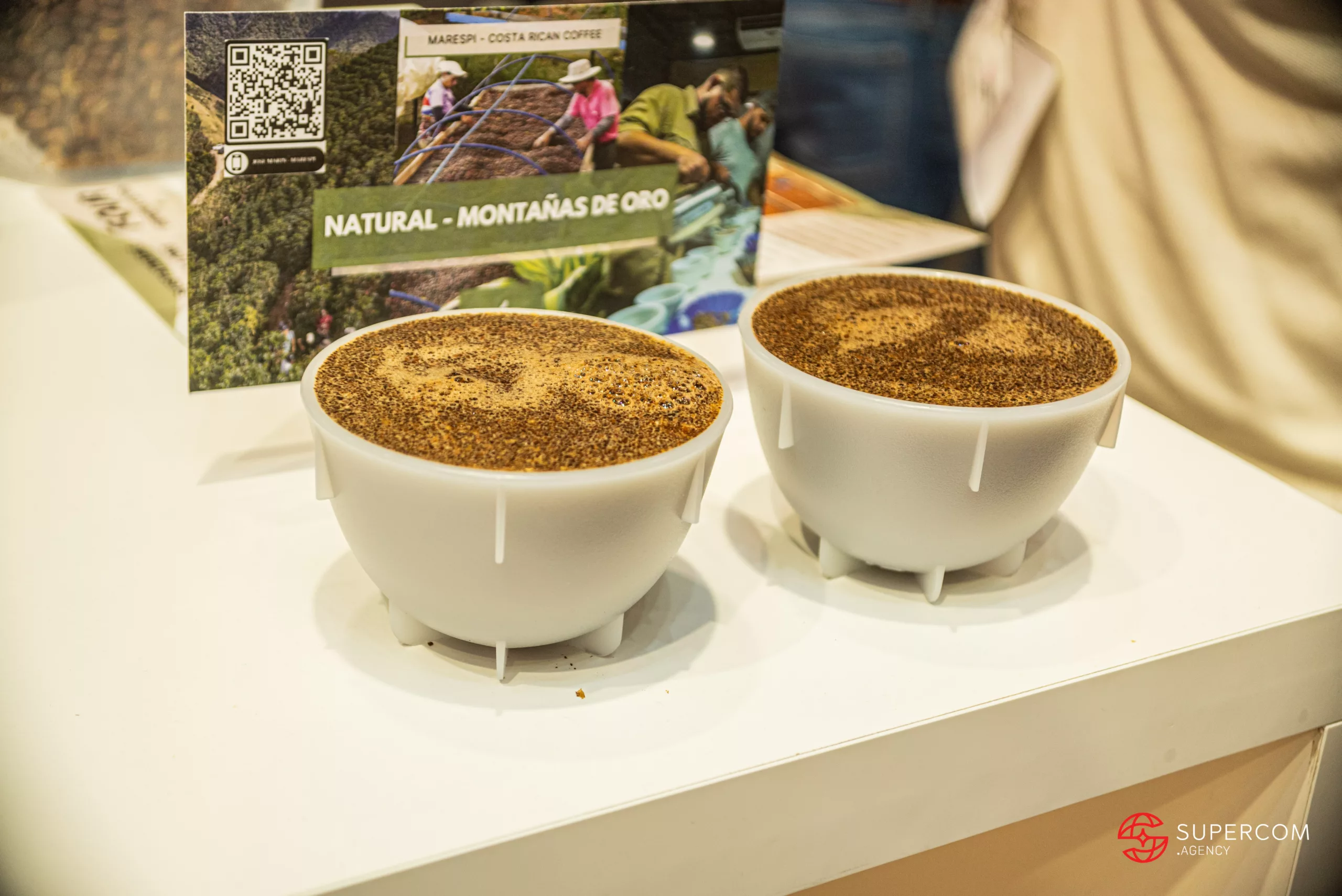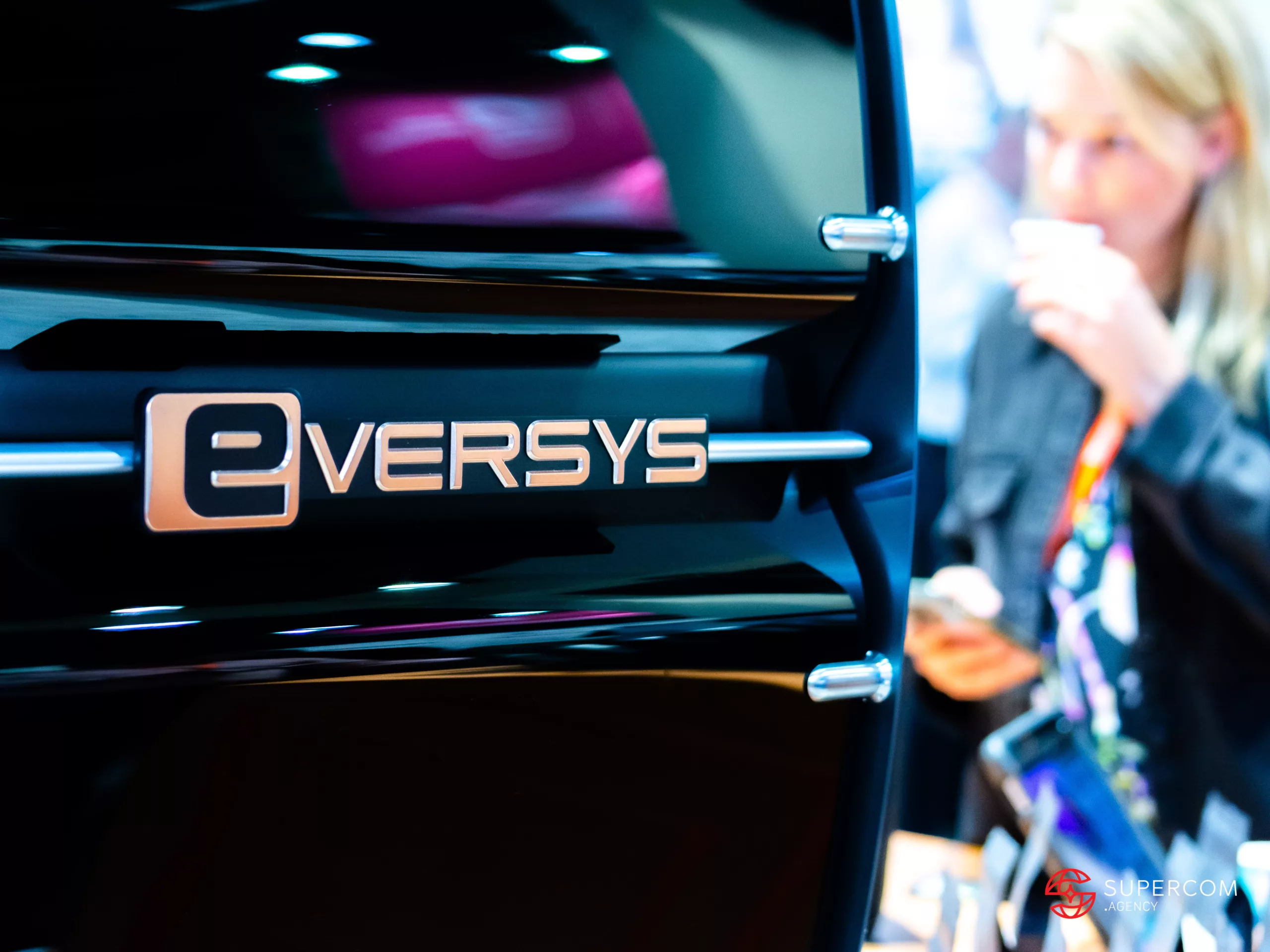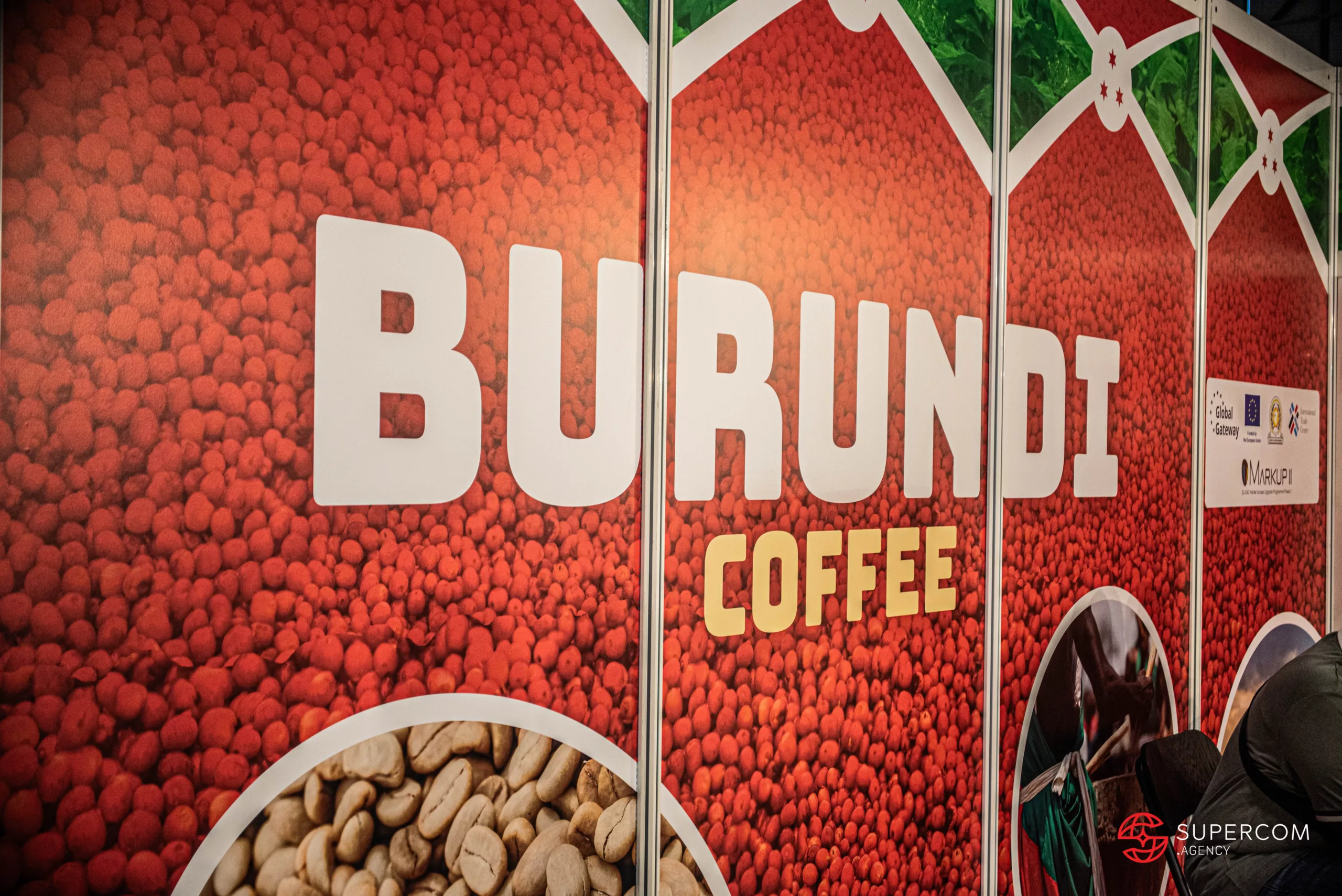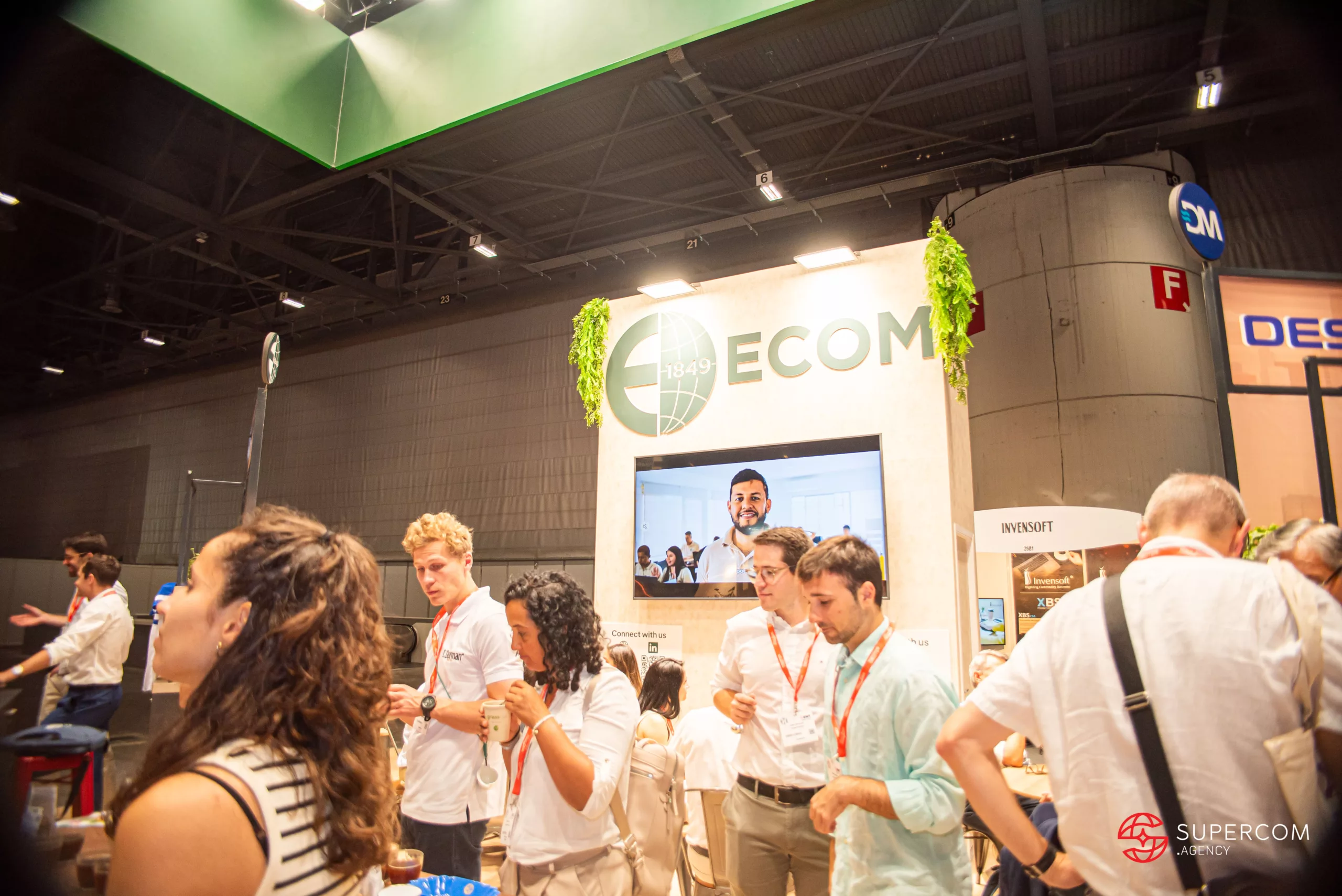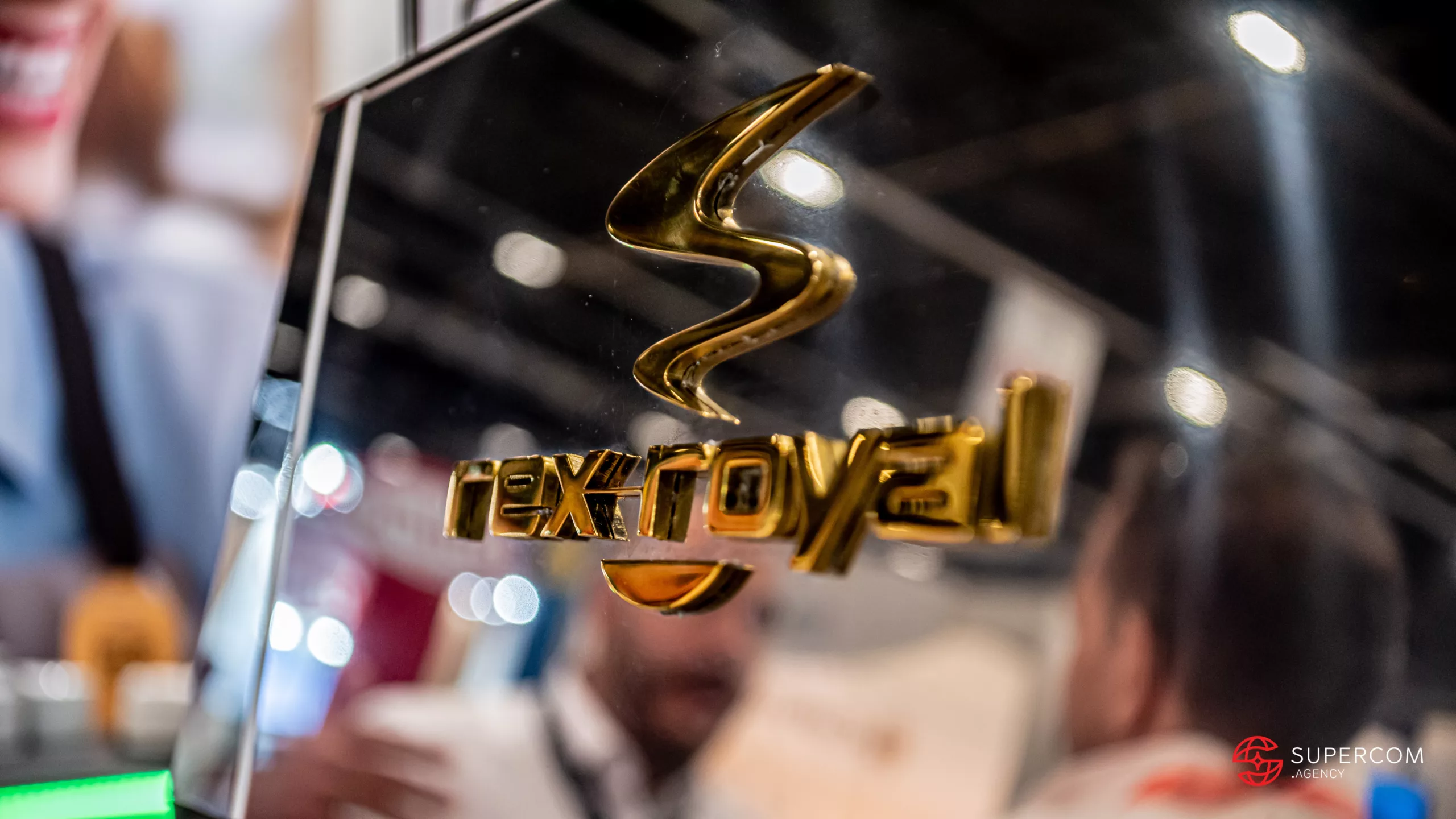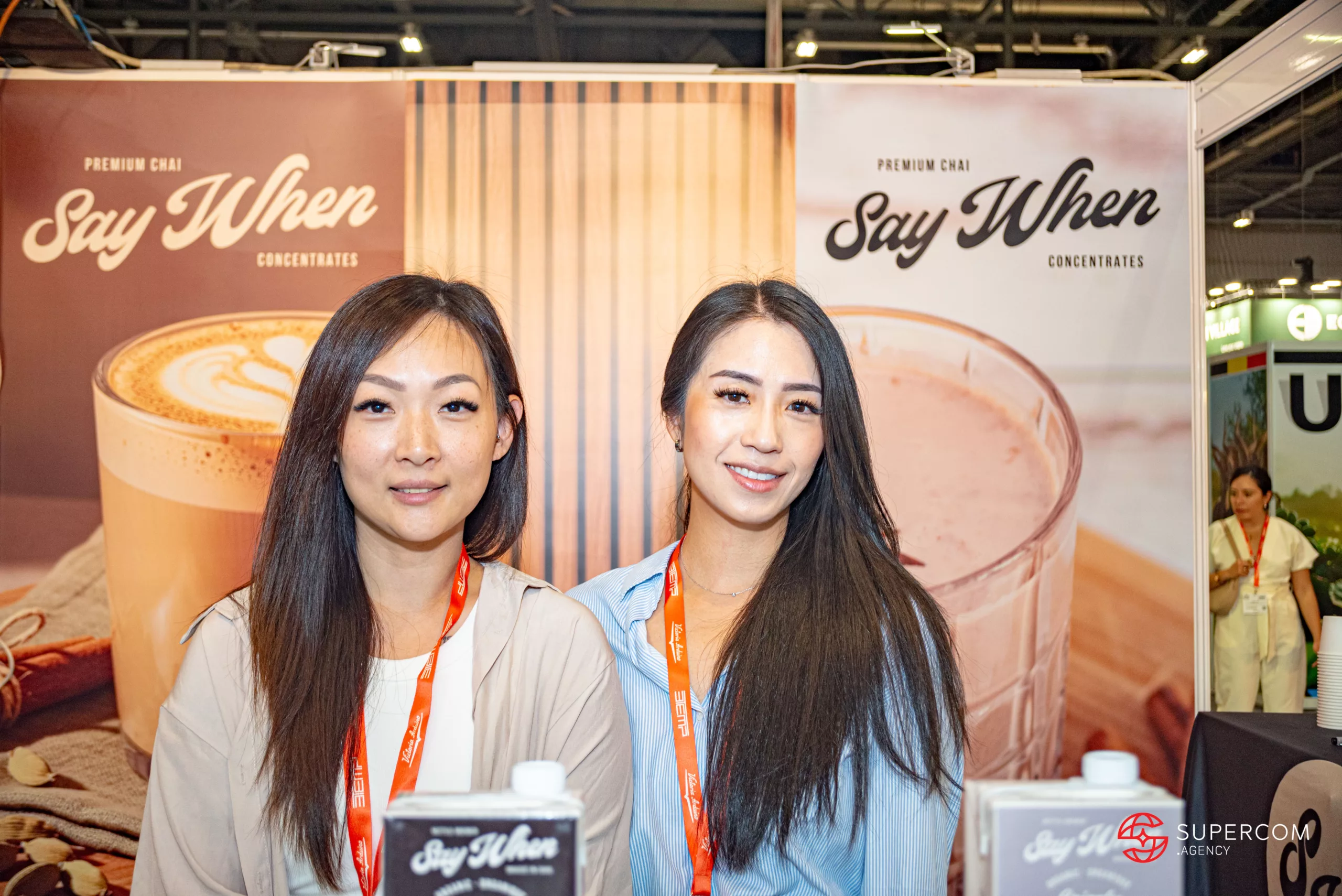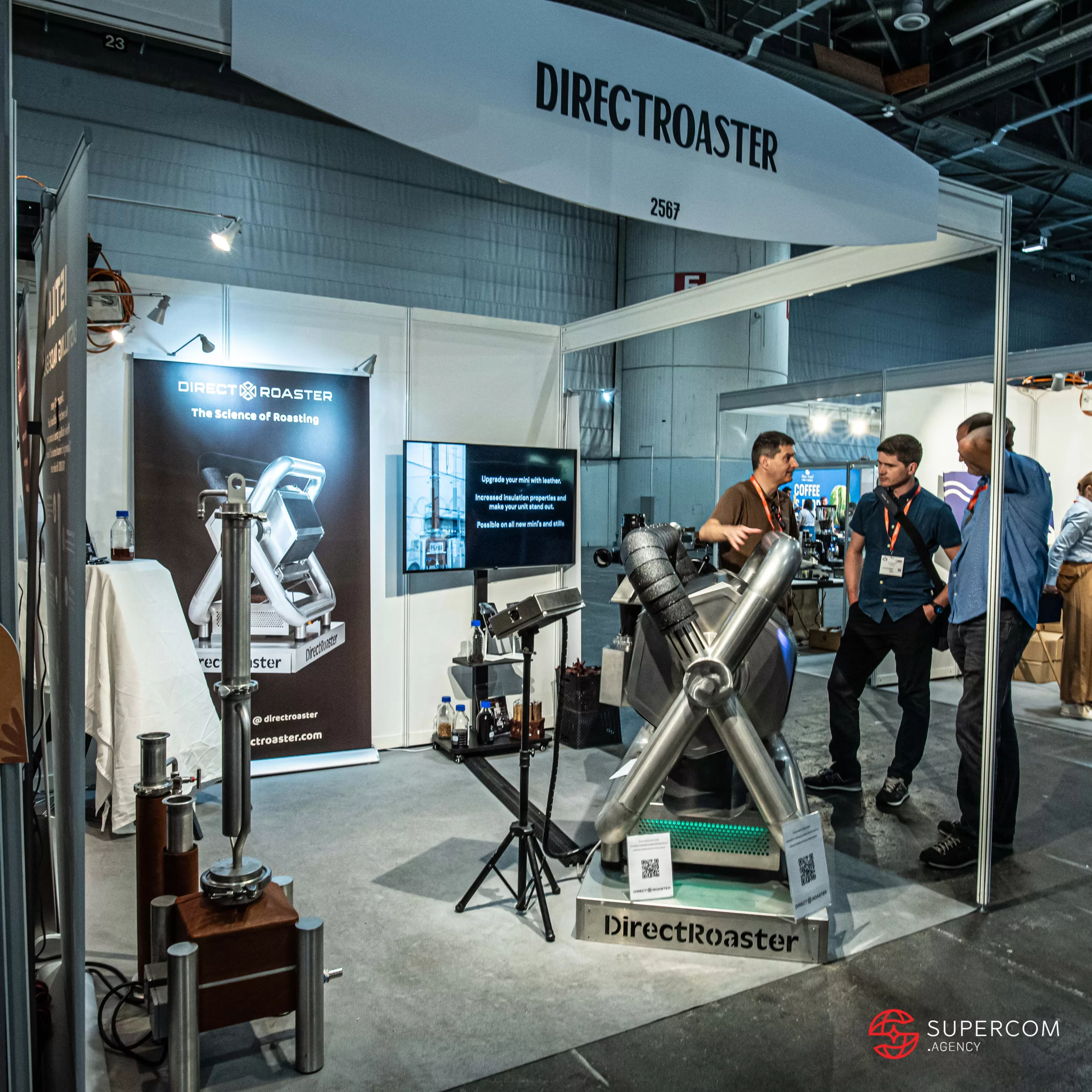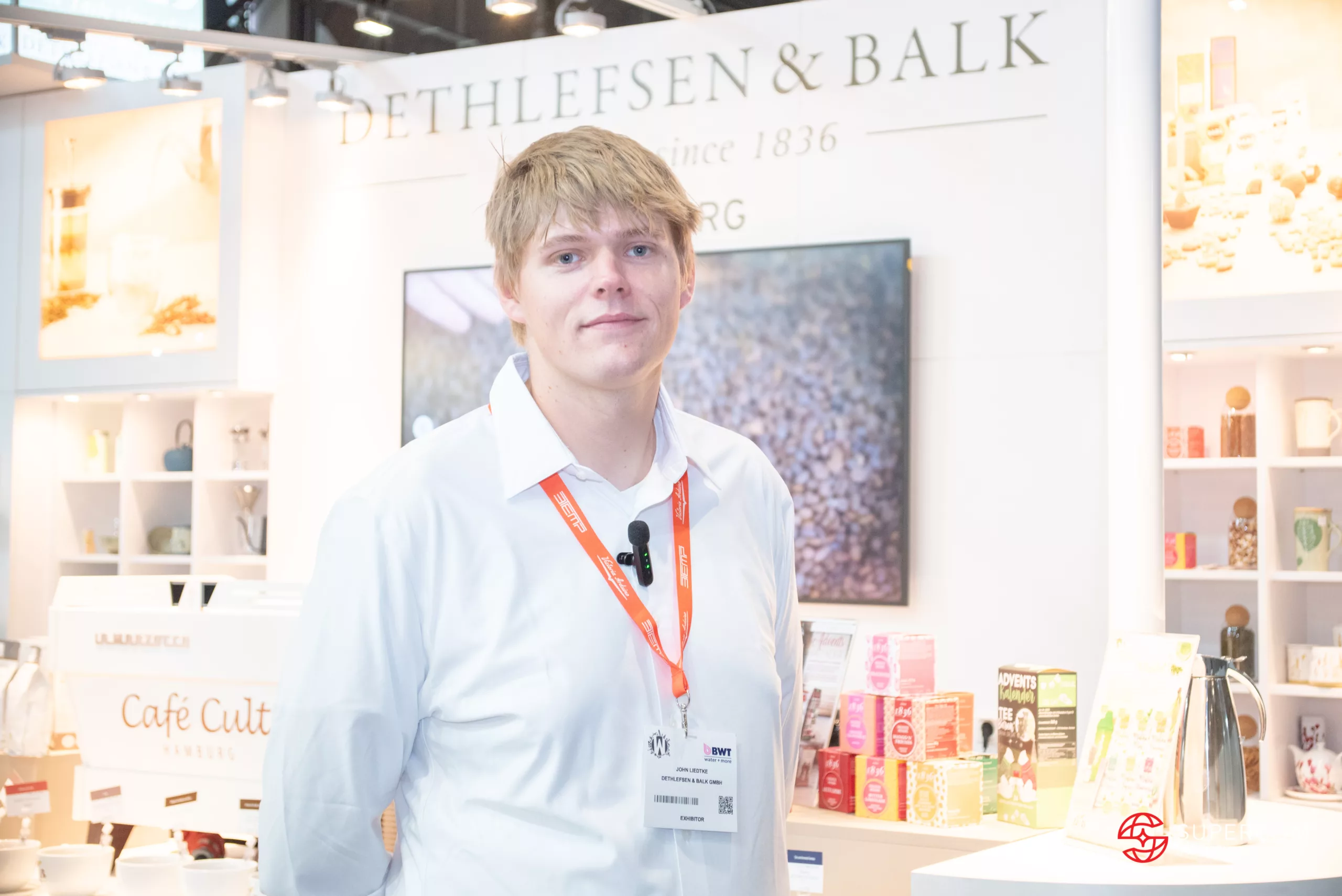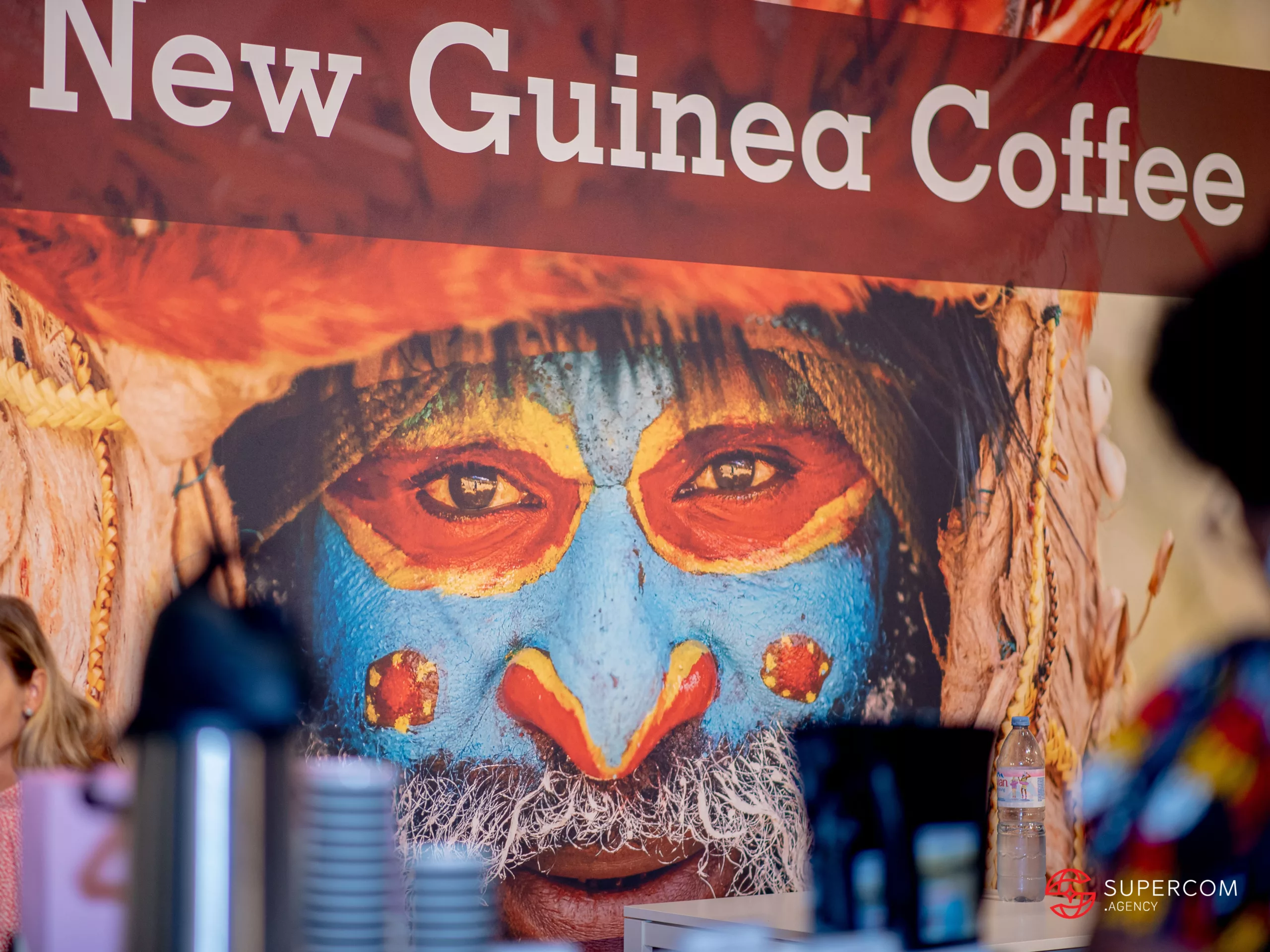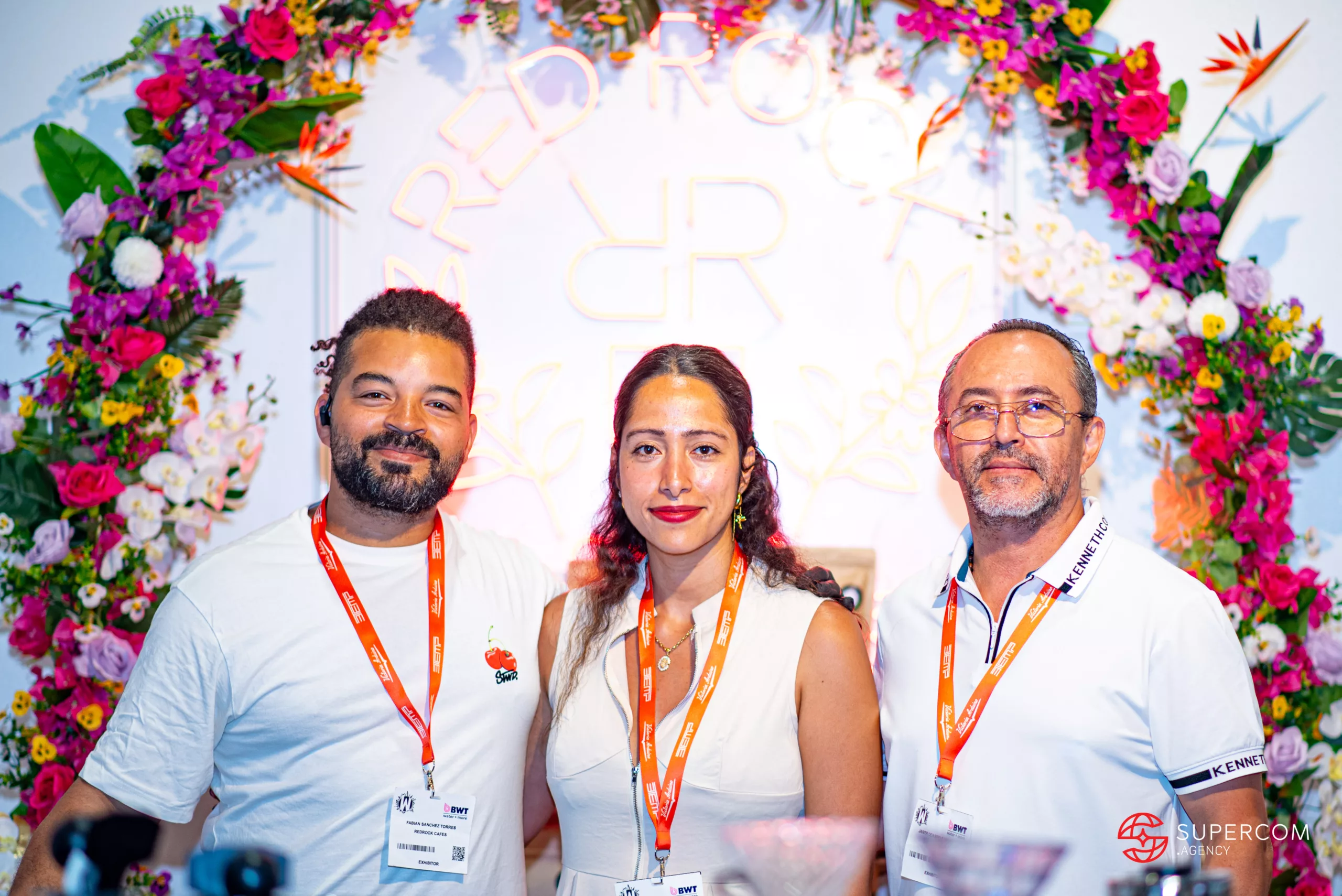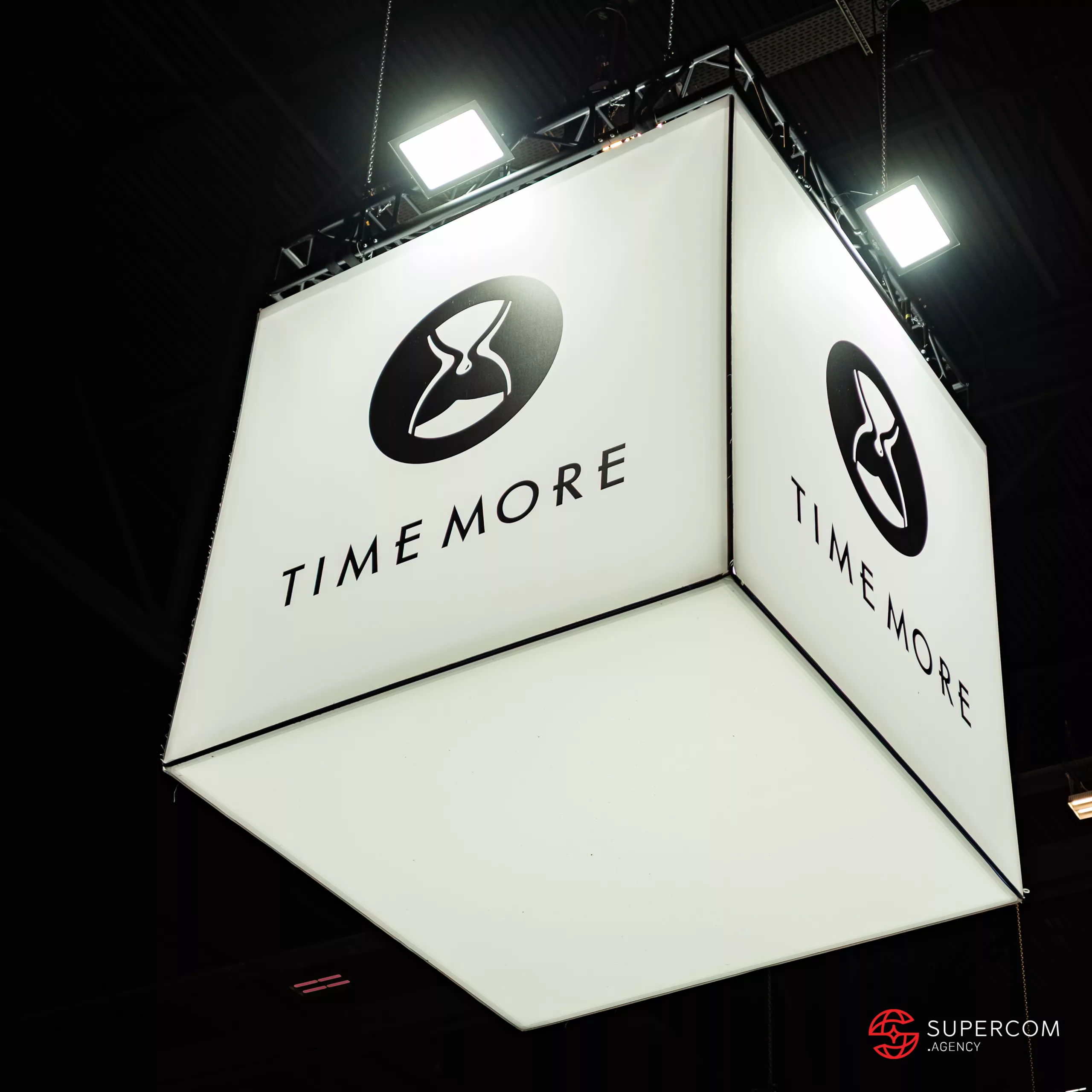Immersion in World Of Coffee Geneva 2025 – The Interview Series – Part 1.
Every year, World of Coffee travels to a different European city, gathering together the global coffee community—from producers and roasters to equipment makers, traders, and sustainability advocates. The 2025 edition took place in Geneva, where the summer heat made the experience feel even more immersive—perfectly setting the stage for a deep dive into the vibrant world of specialty coffee.
But what exactly is specialty coffee? At its core, it refers to high-quality beans—mostly Arabica, occasionally Robusta—that are cultivated with care, often in high-altitude regions, and evaluated for their flavor, traceability, and sustainability. Beyond the cup, specialty coffee also means fair prices for producers, innovation in roasting and brewing, and an ongoing dialogue around topics like the European Green Deal, coffee pricing, and environmental impact.
At this year’s event, we explored the full ecosystem—from espresso machines to filter coffee, grinders, cold brews, and direct trade models. We met with inspiring people shaping the industry and gathered their stories in this two-part interview series.
In Part 1, we share insights and interviews with representatives, owners, and directors from:
Fairtrade International Switzerland, Bialetti, Café de Costa Rica, Eversys, Burundi Coffee, Ecom Trading, Rex-Royal, Say When Chai, Directroaster, Dethlefsen & Balk, Papua New Guinea, Red Rock Cafés and Timemore.
Each brings a unique vision for the future of coffee—whether it’s through innovation, tradition, or sustainability. Let’s dive in.
FairTrade
Building Fairer Trade: An Interview with Fabian Waldmeier, CEO of Fairtrade Switzerland
In an increasingly conscious and connected world, Fairtrade has emerged as one of the most trusted and recognized sustainability labels globally. It represents a movement that champions ethical production, environmental responsibility, and above all, fairer trading conditions for smallholder farmers and workers in developing countries. From cocoa and coffee to bananas and spices, the Fairtrade system ensures that producers receive a minimum price for their goods, along with a premium they can invest in their communities—supporting education, healthcare, and agricultural improvements.
We met Fabian Waldmeier, CEO of Fairtrade Max Havelaar Switzerland, who shared insights into the organization’s mission, operations, and future goals. Here’s our conversation.
Hello Fabian, nice to meet you.
Nice to meet you too!
You’re the director of Fairtrade Switzerland. Can you briefly explain what Fairtrade stands for?
Fairtrade is one of the world’s most recognized sustainability labels. We stand for sustainable production and fair prices. Our goal is to ensure that producers—especially smallholder farmers—can thrive by organizing into cooperatives and receiving not only a minimum price for their goods but also a Fairtrade Premium to invest in their communities. At events like this one, we bring producers from Latin America, Africa, and Asia together with buyers to foster long-term trade relationships. It’s all about building connections and transparency.
What is your main role in Switzerland?
We promote Fairtrade in the Swiss market. That includes working closely with businesses—from retailers and roasters to hospitality players—and running consumer education campaigns. We also collaborate with traders, importers, and producers to support the entire value chain.
And how is Fairtrade financed?
We operate on a licensing model. If a company meets all Fairtrade standards—pays the minimum price and the premium—we allow them to use our label. They then pay us a licensing fee for this. This fee not only funds our operations in Switzerland, but also supports our producer networks around the world, which provide technical assistance and development support directly on the ground.
In Switzerland, which companies do you work with?
We collaborate with a wide range of actors. On the retail side, we work with Coop, Migros, Aldi, and Lidl. We also partner with coffee roasters, caterers for university canteens and hotels, and companies with large staff restaurants. Basically, we try to work with every link in the value chain, including importers and small roasters. Our market share of Fairtrade coffee in Switzerland reached 18% last year, which is great progress—but there’s still a long way to go.
We’ve often heard the name Max Havelaar. What’s the story behind it?
Great question. The name comes from a Dutch novel written during colonial times. Max Havelaar is the character who rebels against the exploitation of colonial systems. When our organization was founded in Switzerland, we adopted the name to symbolize our mission. Today, we operate as Fairtrade Max Havelaar Switzerland, and we are a full member of Fairtrade International, working under the same global standards.
What are your impressions of this trade fair?
It’s a very energizing event. People are talking, discovering, and exchanging ideas. We have producers and retailers under the same roof—it’s the perfect setting for fostering new relationships and discussing innovative strategies. It’s great to see so much enthusiasm for sustainable sourcing.
With 18% market share for coffee, where do you see growth in the future?
We’re definitely optimistic. Growth is happening, especially among small roasters, and we’re seeing encouraging signs in retail and hospitality. Some Fairtrade products, like bananas, have already achieved over 50% market share in Switzerland. So while we don’t expect coffee to reach that level overnight, getting to 25–30% market share in the coming years is realistic.
Is Fairtrade coffee always more expensive?
Not necessarily. Our intervention occurs at the export level, ensuring that farmers receive a minimum price and a premium. The final shelf price depends on many factors like product positioning, packaging, and distribution. In some cases, Fairtrade coffee can even be more affordable than uncertified coffee. It’s a matter of brand and retailer strategy.
What other products are included in your Fairtrade portfolio?
Coffee and bananas are the flagships, but our portfolio is broad. It includes exotic fruits like passion fruit, honey, tea, cereals like rice and quinoa, herbs, and spices. You can find many of these in Swiss supermarkets, and more are coming. That variety helps us appeal to a wider range of consumers and retailers.
Thank you, Fabian! And congratulations on all the impactful work you’re doing.
Thank you! It was a pleasure!
Bialetti
Interview with Roberto De Carli, Head of International Business Development – at Bialetti
Few brands in the coffee world are as instantly recognizable as Bialetti. With its iconic stovetop Moka Express pot, proudly featuring the little mustachioed man, Bialetti has been a symbol of Italian coffee culture for over a century. But the historic company made it clear it is not resting on its laurels. In the midst of a bustling booth showcasing design collaborations, induction-ready models, and a new innovation called Pump My Moka, we met with Roberto De Carli, Head of International Business Development – Coffee, to talk about Bialetti’s evolving identity, its foray into specialty coffee, and how design, innovation, and storytelling continue to drive the brand forward.
Roberto, tell us a bit about the Bialetti Group.
Bialetti is the iconic brand for the moka pot. We started more than 100 years ago, and today we’re proud to say that we are a unique player in the market — not just for manufacturing moka pots, but also because we roast our coffee in-house. This makes us one of the few brands in the world to control the entire experience, from machine to bean. We are present in 90 countries worldwide, and now we’re here at World of Coffee to introduce Pump My Moka — our revolution in coffee preparation.
That name really piques curiosity. What is Pump My Moka?
It’s a complete reinvention of the moka experience. It’s essentially a moka pot equipped with a pump that allows you to control both the pressure and the temperature — two key variables in coffee extraction. This opens the door to more than just traditional moka brewing. You can now experiment with cold coffee recipes, mixology, and even specialty coffee profiles that were previously out of reach for stovetop brewing. It’s a completely new tool with a familiar soul.
Is it already on the market?
We’ve started with some initial sales through our e-commerce platform, and we’re now fine-tuning our distribution channels. It’s a strategic launch — we’re testing how it fits into different coffee communities, from classic moka lovers to specialty coffee enthusiasts.
And what about the beautiful small moka pots you have on display here? Some of them have quite striking designs.
Yes, Bialetti is known not just for its functionality, but also for its collaborations. We’ve partnered with major names like Dolce&Gabbana — we have two special models: Carretto and Blue Mediterraneo. We also collaborate with Netflix. You’ll find moka pots inspired by Bridgerton, Squid Game, and soon Stranger Things. These are collector’s pieces, but they’re fully functional, too.
We also noticed you’re showcasing an induction-compatible moka pot — a big step considering traditional models only worked on gas or electric stovetops.
Exactly. We wanted to preserve the classic design while adapting to modern kitchens. This new moka for induction has the same iconic shape, but with updated materials to make it usable on induction hobs. It’s part of our effort to be both innovative and respectful of our heritage.
There’s been some talk about Bialetti undergoing changes in ownership and strategic direction. Can you speak to that?
Sure. There have been transitions, yes, but the important thing is that our identity — from design to R&D to production — remains firmly rooted in Italy. That’s non-negotiable for us. Bialetti’s legacy is Italian, and that’s where it will continue to grow from.
And what’s your impression of World of Coffee Geneva?
It’s fantastic. This is actually our first time at this type of event, and we’ve been impressed by the quality of the visitors. It’s a gathering of passionate coffee lovers and professionals — the perfect audience for our message. We’re already considering our presence at the next edition in Brussels in 2026.
Finally, as a brand so widely known, are you also moving into coffee shop concepts or experiences?
Yes, that’s something we’re exploring. Our goal is to introduce the moka pot — and the culture around it — to new audiences, especially in the specialty coffee space. We’re thinking about how we can create experiences that go beyond retail, whether that’s through coffee shops or curated tastings.
Thank you Roberto!
Enjoy the trade show!
Quick takes
From stovetops in Italian kitchens to designer collaborations and specialty innovations, Bialetti continues to evolve without losing sight of what made it iconic in the first place. With the launch of Pump My Moka, induction-compatible designs, and pop culture partnerships, the brand is proving that even a 100-year-old moka pot can keep up with the future of coffee.
Café Costa Rica
Costa Rica’s Coffee Legacy: A Conversation with ICAFE’s Andrés Piedra Fallas
Costa Rica is renowned for its high-quality Arabica coffee, cultivated in rich volcanic soils and high-altitude microclimates. Known for its floral aromas, bright acidity, and clean, balanced profiles, Costa Rican coffee reflects the country’s deep-rooted commitment to excellence and sustainability in every cup.
The Costa Rica stand stood out with its clean, open design and welcoming atmosphere. Visitors were invited to experience fresh brews and take part in live coffee cupping sessions, allowing them to taste and compare a variety of regional profiles firsthand. Together, they offered insights into what makes Costa Rican coffee exceptional, from quality and regulation to flavor and sustainability.
We had the pleasure of speaking with to a key figure representing Costa Rica’s coffee excellence: MSc. Fco. Andrés Piedra Fallas, Promotion Manager at the Costa Rica Coffee Institute (ICAFE). We also met José Marín, Marketing & Coffee Sales at Marespi based in Pérez Zeledón. José offered us a tasting of freshly brewed Costa Rican coffee that beautifully showcased the region’s signature Arabica flavor profiles.
Here our interview of Andrés Piedra Fallas.
Hello Andrés, nice to meet you. Can you introduce yourself?
Hello! My name is Andrés Piedra Fallas. I am the Promotion Manager at the Costa Rica Coffee Institute, also known as ICAFE.
What makes Costa Rica unique in the world of coffee?
Costa Rica is very different from other coffee-producing countries. We have a unique law that regulates the entire coffee value chain. This law defines how producers, processors, exporters, and roasters interact. It’s all designed to ensure transparency, fairness, and high quality. The law ensures that producers receive a fair share of the export price.
What type of coffee is produced in Costa Rica?
Costa Rica is 100% Arabica. By law, it is forbidden to grow Robusta coffee here. That means we focus entirely on quality. Although we produce only about 0.7% of the world’s coffee, we are recognized for our exceptional quality.
The 2025 European Green Deal: Sustainability seems to be a big focus. Can you tell us more?
In 2025, the European Union implemented the European Green Deal, introducing new regulations to ensure imported commodities like coffee are produced without deforestation. Countries were assessed and classified as low, medium, or high risk based on environmental practices and transparency. Costa Rica stands out as the only coffee-producing country in the Americas officially designated as a ‘low-risk origin.’ This status simplifies export procedures to Europe and highlights Costa Rica’s long-standing commitment to sustainable land use, traceability, and forest conservation.
We have strict policies for forest conservation, river protection, and reforestation. More than 80 years of coffee production here has gone hand-in-hand with environmental responsibility.
And what about the social side?
All coffee harvesters in Costa Rica, including migrant workers from Panama, are covered by health insurance. That includes maternity and social security. We’ve also created kindergartens at harvesting sites so that children are cared for while their parents work, preventing child labor and supporting families.
What does the Costa Rican coffee sector look like in numbers?
We have around 25,000 producers working 82,000 hectares. There are 308 processing plants, known as “beneficios,” and 94 exporters. Many producers are also processors and exporters. We promote equal opportunity, so any producer can participate in international events like this one.
How is your coffee structured regionally?
Costa Rica has seven main coffee-producing regions: the North Zone, Central Valley, Western Valley, Turrialba, Los Santos, Tarrazú, and Coto Brus. Each has its own microclimates, altitudes, and flavor profiles. For example, Los Santos is the highest-producing region, and Tarrazú, part of Los Santos, holds a Denomination of Origin for its unique quality and heritage.
What is your goal at events like World of Coffee?
Our aim is to promote Costa Rican coffee globally. We offer space at our stand to producers who cover their own travel and lodging, while the institute covers the stand’s cost. Here in Geneva, we have around 20 representatives showcasing their coffee.
Final thoughts?
Costa Rica can’t compete on volume, but we compete on excellence—on quality, sustainability, and transparency. That’s what sets us apart.
Eversys
Redefining Automation: Eversys SA and the Future of Coffee Excellence
Interview with Michele Mastrocola, Director Partner Channels
Based in the heart of Switzerland, Eversys SA is a pioneer in high-end, fully automatic coffee machines that deliver traditional espresso quality with the ease of automation. Founded around 15 years ago, the company has made it its mission to serve the best cup of coffee possible, combining Swiss precision with a deep understanding of espresso culture. Eversys calls its technology “super traditional”—machines that preserve the craftsmanship of baristas while optimizing workflow and consistency. With a global footprint, Eversys serves both large coffee chains and specialty cafés seeking efficiency without compromising on quality.
At the World of Coffee, we sat down with Michele Mastrocola to talk about their latest machines, brand evolution, and what sets Eversys apart. During our visit, we also had the pleasure of meeting Ophélie Vergères, who was representing the team alongside with Michele and others.
Hello Michele, nice to meet you. Can you tell us a bit about Eversys, the machines, and your customers?
Hello. Well, Eversys is based in Switzerland, born around 15 years ago. The idea was always to serve the best cup of coffee possible. Quality in the cup has always been—and still is—our core focus. Over the years, we’ve grown globally, covering the increasing demand for fully automatic machines.
We call ourselves “super traditional” because our machines are fully automated, but engineered to preserve the soul of espresso. Our current lineup includes four units: Enigma, Shotmaster, Cameo, and Legacy. Each serves different needs, but they all deliver exceptional cup quality.
Our customers vary widely. While we work with major coffee chains, we also cater to independent specialty cafés who are looking for workflow efficiency but won’t compromise on quality. We still believe the human component behind a machine is essential. We’re not just another automatic machine—our goal is to empower great coffee experiences.
Can you tell us about the latest machine you’re showcasing here?
At this show, we’re presenting the entire portfolio, but the newest member of the family is the Legacy. It’s incredibly versatile—you can configure it with two, three, or four grinders, meaning you can brew with different beans at the same time. It’s compact, with a minimal footprint, and offers powder integration as well.
That means one machine can prepare both hot and cold beverages—like a matcha latte or, today, a Blueberry Breeze, with just a touch of a button. The Legacy really embodies what we stand for: quality, flexibility, and innovation.
How has the trade show been for you so far?
It’s been great. Of course, generating leads is important, but for us this event was also about launching a new communication strategy and a new visual identity. It’s not just about the machines—it’s about how we present ourselves to the coffee world.
If you knew Eversys before, you’ll see a completely new brand experience now. We received very positive feedback from the audience. The stand itself, our storytelling, and our engagement—it’s a fresh chapter for Eversys, and we’re excited about where it’s heading.
Michele, thank you very much.
Thank you—and I wish you a great show as well!
Burundi Coffee
Burundi’s Coffee and the Road to Sustainable Excellence – A Conversation with Augustin Manirakiza from ITC Burundi
At the Burundi stand, the aroma of freshly brewed coffee fills the air. Visitors are drawn in by the warm welcome and the chance to taste a cup with a story behind every bean. We meet Augustin Manirakiza, a passionate figure in Burundi’s coffee sector, deeply involved in production, sustainability, and value promotion. Coffee cupping was actively happening at the booth, attracting a curious and engaged audience.
Hello Augustin, thank you for taking the time. Can you tell us who you are and your role in Burundi coffee?
I’m Augustin Manirakiza, and I have dedicated much of my professional life to Burundi’s coffee sector. I am part of the national push to promote Burundi coffee at the international level, support our producers, and help them adapt to new global regulations, especially around sustainability and deforestation.
What makes Burundi coffee special?
Burundi is a small country, but our coffee is rich in complexity and character. We cultivate mostly Arabica, particularly the Bourbon variety, which thrives in our high-altitude regions with volcanic soil and temperate climate. Our coffees are known for their bright acidity, floral notes, and sweet, clean cups – very sought-after by specialty roasters.
How is Burundi adapting to new European regulations like the EU Deforestation-Free Products Regulation?
The new regulation that took effect in 2025 requires that coffee imported into the EU must be proven not to have contributed to deforestation. This is a major challenge but also an opportunity. In Burundi, we are launching training programs and working closely with farmers to improve traceability and compliance. We’re mapping coffee plots with GPS, creating digital records, and supporting cooperatives with the tools they need to comply. It’s crucial for access to the European market.
Tell us more about the competitions we’ve heard about in Burundi to promote coffee quality.
Yes, we’ve organized national competitions to valorize the work of our producers and push for excellence. These events allow farmers to showcase their coffees, receive feedback, and connect with international buyers. It’s a way to motivate producers and elevate the entire supply chain. One such competition even turned into a major platform for young Burundians to discover careers in the coffee sector.
What is your main goal at this trade show?
We’re here to build new relationships and show that Burundi is serious about quality and sustainability. We want people to taste our coffee and understand that behind every cup, there are smallholder farmers working hard, often on just one hectare of land, to produce something exceptional.
What are the most common coffee processing methods in Burundi
Most of our coffee is washed (fully wet-processed). This method helps highlight the brightness and clarity of our Bourbon Arabica. But we are also experimenting more with natural and honey processing, which can bring out fruitier and more complex flavors – something roasters increasingly appreciate.
Are there any challenges unique to Burundi coffee today?
Definitely. In addition to adapting to regulations, we are also facing logistical and financial challenges. But what makes us optimistic is the resilience and determination of our farmers. With the right support and recognition, Burundi coffee can continue to grow and shine globally.
Final word for coffee lovers?
Yes – when you drink Burundi coffee, you’re tasting a country’s soul. And you’re supporting a future where coffee and forest conservation go hand in hand.
ECOM Agroindustrial
Global Impact, Local Roots – Interview with Rita Bouhout-Negre of ECOM Agroindustrial
We had the opportunity to speak with Rita Bouhout-Negre, Global Marketing Director at ECOM Agroindustrial Corp. Ltd., one of the world’s largest soft commodity trading groups, with a strong presence in coffee, cocoa, and cotton. ECOM is a family-owned company headquartered in Switzerland, operating in over 40 countries through more than 150 subsidiaries.
Hello Rita, nice to meet you. Can you introduce yourself and tell us about your role at ECOM?
Yes, of course. My name is Rita Bouhout-Negre, and I am the Global Marketing Director at ECOM Agroindustrial. ECOM is an international trading and supply chain management company. I oversee the group’s global brand positioning and marketing strategy across all divisions — with a strong focus on coffee, which is one of our core businesses.
How would you describe ECOM to someone not familiar with the group?
We are a major player in the commodity world, but we are also much more than a trading company. In coffee, we are involved all the way from the farm level — working directly with producers — to the final delivery of green coffee to our clients. That includes sustainability programs, digital traceability, logistics, financing, and quality control. Our strength is combining global scale with deep local roots.
Where are your main markets and operations based?
Our operations span Latin America, Africa, and Asia — anywhere coffee is grown. Brazil, Colombia, Vietnam, and Ethiopia are some of our key origins. But our commercial presence is truly global: we have offices and clients across Europe, North America, and Asia. We serve large roasters, specialty buyers, and everything in between.
What was your goal in attending World of Coffee this year?
Events like this are essential. They allow us to reconnect with long-time clients, discover new prospects, and share updates from our field projects. It’s also a space to listen — to understand how consumption habits are changing, what roasters are looking for, and how the specialty segment is evolving. We come here not just to talk, but to learn.
Is ECOM involved in the specialty coffee sector as well?
Yes, very much so. We work with smallholder farmers in producing exceptional microlots, fully traceable and often organic-certified. Through our field teams and subsidiaries, we support farmers in meeting the specific demands of the specialty market. But we also adapt — some clients are in the premium segment, others focus on volume with consistent quality. We tailor our approach.
What trends or challenges are you seeing in the market today?
Covid shifted many things. Some clients lost their specialty focus temporarily, but we’ve seen a strong rebound. Traceability and sustainability are no longer “nice-to-have” — they’re expected. At the same time, climate change is affecting production, so we need to invest in more resilient farming models. That’s where our long-term approach makes a difference.
Can you give an example of how ECOM adapts to different market segments?
We supply to a wide range of clients — from independent roasters in Paris to large chains like Starbucks or Lavazza. Each has its own needs, and we adapt accordingly. For some, it’s about cup profile. For others, it’s origin traceability or impact metrics. We have the data, the people, and the network to deliver across that spectrum.
Final thoughts — what excites you most about the coffee industry today?
Its dynamism. There’s always something new happening — whether it’s in fermentation techniques, consumer tastes, or sustainability expectations. And coffee continues to be a bridge — connecting people, cultures, and livelihoods. That’s what keeps me passionate about what we do.
Thank you Rita!
Thank you as well and don’t forget to get your coffee!
Rex Royal
Swiss Precision and Power: Rex-Royal‘s Fully Automatic Coffee Machines
At the World of Coffee event, we stopped by the booth of Rex-Royal, a Swiss company renowned for its cutting-edge, fully automatic coffee machines designed for the professional sector. With over 85 years of experience, Rex-Royal stands out for its commitment to Swiss engineering, sustainability, and uncompromising quality. All machines are conceived, developed, and manufactured entirely in Dällikon near Zurich, ensuring complete control over every detail — from design to performance. Whether it’s for a bustling hotel breakfast, a busy café, or large-scale catering operations, Rex-Royal provides robust solutions that combine user-friendly technology with premium coffee results.
We had the pleasure of speaking with Marco Schwarzenbach, Marketing Manager, to learn more about the brand’s philosophy and their latest innovations.
Hello Marco, nice to meet you. Could you tell us a bit about Rex-Royal and your role?
Nice to meet you as well. I’m responsible for marketing at Rex-Royal. We’re a Swiss manufacturer of professional, fully automatic coffee machines. Our company was founded in 1937, and all our machines are designed, developed, and produced here in Switzerland, in Dällikon, just outside of Zurich.
And where are your main markets? Do you mostly sell in Switzerland or also abroad?
We’re globally active. Switzerland is of course an important home market, but we’re also very strong in Europe and expanding in Asia. We have a branch in southern Germany, in Rheinfelden, and another one in Singapore. Wherever there’s a demand for high-performance coffee machines, we’re present — usually working through local partners and distributors.
Who is your ideal customer?
We cater to the professional sector: hotels, restaurants, the hospitality and care sectors — anywhere there’s a need for large volumes of high-quality coffee served quickly. Internationally, we work a lot with distributors and coffee roasters as well.
You brought a machine with you to the show. Can you tell us more about it?
Yes, this is our latest model, the Rex-Royal S500 — a real powerhouse. It can produce 250 to 350 coffees per hour, depending on the extraction time, and has a capacity of 58 liters of hot water per hour. It also allows you to produce everything simultaneously — no waiting.
Wow, that’s impressive. What are some of its standout features?
The S500 comes with a 10-inch touchscreen and includes our PowerSteam module, which automatically foams milk — whether it’s cow’s milk, almond, oat, or soy. You can set the temperature and air supply individually for each type. It also connects directly to a cooler, so with the push of a button you can get a perfectly crafted cappuccino.
Are you also serving coffee at your booth today?
Of course! We’re always happy to showcase the quality of our machines. Would you like a cappuccino?
Definitely!
Thank you very much. Marco, it’s been a pleasure speaking with you.
Likewise. Thanks for stopping by.
Say When
A Taste of Chai from Canada to the World: Say When at World of Coffee
Say When is a Canadian company specializing in organic chai concentrates, proudly handcrafted for over 23 years. Based in British Columbia, the brand has become a staple in the North American specialty coffee and café industry. Known for its authentic recipes and high-quality ingredients, Say When is now expanding into Europe, offering a flavorful alternative to traditional coffee drinks.
At the Say When booth, the warm aroma of spices lingered in the air, inviting visitors to take a moment and sip on something different: authentic organic chai.
There we met Catherine Brooks, who works for Catherine Wong, Director of Sales & Marketing, who gave us a deeper look into the world of chai.
Hello Catherine, can you tell us a bit about Say When?
Yes! Say When has been making organic chai concentrates for the past 23 years. Chai is a very popular beverage in the specialty coffee industry, and it’s been exciting to see it grow year after year. More and more people are discovering chai for the first time.
You’re well known in North America, but maybe less in Europe. Can you tell us more about your markets?
Absolutely. We’re well known in Canada and sell a lot into the U.S. as well. And we’re now expanding into different parts of Europe too, which is why it’s so great to be here at World of Coffee.
Can you tell us more about the chai blends you offer?
We have three main blends. Each varies in the type of tea, spices, and sweetness level.
- Our Authentic Chai is beautifully balanced, with classic spice notes and black tea.
- Another version is slightly sweeter, with warmer, comforting flavors—some say it reminds them of chestnut or even Nutella!
- We also have a spicier variant for those who want a stronger kick.
We design each blend to deliver a smooth, rich chai experience that baristas and home brewers alike can enjoy.
What makes your chai concentrates stand out compared to others on the market?
Great question! Our chai is certified organic and made using real brewed tea and whole spices—no artificial flavors or shortcuts. It’s also shelf-stable, easy to use, and designed with baristas in mind. The goal is to give customers that “handcrafted” chai taste in every cup, without complicating prep time in cafés.
How do cafés usually serve your chai? Any tips for baristas?
The most popular way is the classic chai latte—just mix the concentrate with steamed milk or a milk alternative. It’s super versatile and works both hot and iced. Some cafés also use it in creative ways—like chai affogatos, chai lemonades, or even in baking recipes. We also provide support and training to help teams get the best flavor extraction and presentation.
Where can people find your products?
You can learn more and order online at Say When. We’d love to connect with coffee shops, distributors, and chai fans across Europe.
Direct Roaster
A New Vision of Roasting: Efficiency, Transparency, and Innovation with Direct Roaster
At the World of Coffee, we discovered a standout innovation from the Netherlands: Direct Roaster, a company redefining how we roast coffee. Based near Utrecht, Direct Roaster combines the engineering expertise of iStill, a renowned manufacturer of distilling equipment, with a passion for specialty coffee. The result? A cutting-edge roasting machine that is highly energy-efficient, fully transparent in design, and ideal for scale-ups and professional roasters looking to optimize quality, control, and sustainability.
Unlike traditional roasters, Direct Roaster machines feature an open, “naked bike” architecture — where all parts are visible — and integrate clever engineering such as preheated air circulation, cascade-controlled heating, and low-exhaust technology. They offer two models: a 5 kg and a 15 kg version, both using up to 50% less energy than conventional systems. Quiet, safe to touch, and plug-and-play with a standard industrial outlet, these roasters are as innovative in form as they are in function.
We talked with Bob Aertsen, co-developer of the machine, to dive deeper into this new roasting concept.
Hello Bob, can you introduce yourself and your company?
My name is Bob Aertsen, and I’m working in partnership with Dr Edwin van Eijk, the owner of iStill on the Direct Roaster project. Exactly one year ago, we were approached with a request for a coffee roasting machine. When we examined what existed, we realized the typical roasting solutions weren’t good enough. So, we started with a blank sheet of paper. We asked: “What is a coffee roasting machine?” The answer: a spinning drum applying heat. That’s what we built — a drum that applies heat — and we decided to display it openly, like a naked bike, so you can see everything that’s happening.
What are the standout features of the machine?
Everything is temperature-controlled. One major advantage is energy efficiency — our machine uses about 50% less energy compared to traditional roasters. It’s available in 5 kilo and 15 kilo versions, with the only difference being the heating element. The roasting time is comparable to others, between 10 and 15 minutes depending on the profile — light or dark roast — but done with less energy.
Another key feature is our preheated air system: we recover hot air from the drum to preheat incoming air. The result? Less energy needed to reach roasting temperature and far fewer fumes — the exhaust air is only 80°C, so extensive ventilation isn’t required.
This machine looks quite different visually — is that part of the concept?
Absolutely. One of the core ideas was transparency — in both the literal and figurative sense. The machine has an open architecture: all components are visible. Roasters can understand exactly what’s going on at any time, which is great for training, maintenance, and building customer trust. We didn’t want to hide the technology — we wanted it to be part of the craft.
Who is this machine designed for?
Primarily for scale-ups and established coffee roasters. The 5 kilo model is especially useful for small operations — it runs on a standard 16-amp industrial plug, so there’s no need to modify your building’s electrical setup. But we can scale up — up to 100 kilos if needed. We’re machine builders, but very much focused on taste.
Can you mention something about extraction and distillation?
Yes, this is where it gets really exciting. Alongside the roaster, we’ve developed equipment to extract sugars from the coffee chaff — which is normally a waste product. From this, you can create new products like syrups, liqueurs, or even fermented beverages. You can also use it in food — imagine cake flavorings or custom drinks made from what used to be waste. This opens the door to entirely new revenue streams for coffee roasters and cafés.
So these are two separate machines?
Correct. The roaster and the extraction unit are separate, but share a similar design philosophy — both are “meijerend,” which refers to the consistent, controlled way heat is applied. That principle allows precise roasting or fermentation, even under changing environmental conditions.
Where are you based?
Near Utrecht in the Netherlands. And yes, the Dutch accent probably gave that away!
What are your expectations here at the World of Coffee?
We’re here to meet roasters, café owners, innovators — anyone who wants to go beyond traditional roasting. We’re offering not just a machine, but a new vision of roasting. It’s about control, efficiency, creativity — and ultimately, better coffee.
Anything else that sets the machine apart?
Yes — safety and presentation. Our machine never gets hotter than 40°C on the outside. That means you can display it in your coffee shop without risk of burns. It becomes part of the experience, visually engaging while staying functional and efficient. It’s also extremely quiet compared to conventional roasters — which makes it ideal for cafés where customer experience matters.
Thank you, Bob.
You’re welcome. It’s all about giving roasters more control, less complexity, and new creative possibilities.
Dethlefsen & Balk
Tradition Meets Taste: Interview with John Liedtke from Dethlefsen & Balk
Dethlefsen & Balk GmbH is one of the oldest tea and coffee trading companies in Europe, with roots dating back to 1836. Based in Hamburg, Germany, the company originally specialized in fine teas, establishing itself as a leader in the wholesale trade of high-quality loose leaf teas. Over the years, Dethlefsen & Balk expanded its offerings to include specialty coffees, accessories, and private-label solutions tailored for the global hospitality and retail sectors. Their product philosophy combines tradition with innovation, aiming to offer both timeless classics and trend-driven beverages.
At World of Coffee Geneva, we spoke with John Liedtke, from the Coffee Department at Dethlefsen & Balk.
Ok, so John Liedtke. Hello, could you tell us a little more about Dethlefsen & Balk?
Yes, of course. Dethlefsen & Balk started as a tea company back in 1836, based in Hamburg. So it’s been quite a long journey. Originally, the business focused exclusively on teas, but over time we extended our portfolio to include coffee. Today, we serve a wide range of wholesale customers.
What kind of coffee do you offer? Who are your typical clients?
We offer high-quality coffees primarily to wholesalers — that’s our core market. This includes gastronomy clients, coffee shops, tea shops, and increasingly, online retailers who specialize in premium products. While we don’t sell directly to consumers ourselves, our partners do.
Is your coffee also available in cafés?
Yes and no. Our coffees are used in cafés, but we don’t operate cafés ourselves. Instead, we work behind the scenes by providing coffee to businesses that serve end customers. That includes bakeries, specialty shops, and more.
What’s your role at the event?
I’m here to connect with our clients and make new contacts. It’s important to showcase not only our products but also the spirit of collaboration that defines our company. I’m focused on the coffee segment, but we also have strong roots in tea, which remains a major part of our business.
A word about Café Cult?
One of Dethlefsen & Balk’s most prominent coffee brands is Café Cult. It stands for premium-quality roasted coffee, targeting the discerning coffee lover who values origin, roast profile, and flavor complexity. Café Cult offers a wide range of single-origin coffees and blends, with a clear emphasis on sustainability, traceability, and sensory excellence. Whether it’s tea or coffee, Dethlefsen & Balk remains a symbol of quality, tradition, and trust in the beverage wholesale world.
Thank you John
Thank you!
Papua New Guinea COFFEE
Papua New Guinea’s Hidden Gem”: A Conversation with Jeisa Konts from Banz Kofi
Papua New Guinea, though lesser-known on the global coffee stage, produces some of the most distinctive and complex Arabica coffees in the world. Grown in the fertile volcanic soils of the Eastern and Western Highlands, often at higher altitudes above 1,800 meters, PNG coffee is celebrated for its bright acidity, full body, and rich, earthy undertones. What sets it apart is not only the terroir but also the traditional, organic farming methods maintained by generations of smallholder farmers. It’s a place where coffee is more than a crop—it’s a culture.
At the vibrant World of Coffee Geneva, nestled among cupping tables and the aroma of freshly roasted beans, we encountered Jeisa Konts, exhibitor for Banz Kofi, a specialty coffee brand hailing from Papua New Guinea. Their booth immediately caught our attention—not just for the warm hospitality, but for the deep story behind every bean.
Hello Jeisa, great to meet you. Can you tell us a bit more about Papua New Guinean coffee and what makes Banz Kofi unique?
Yes, of course! So, our coffee from Papua New Guinea is truly special. It’s 100% organic, single origin, and Grade A Arabica. What’s important to us is that it’s grown using traditional, natural methods. We work with smallholder family plots around Mount Hagen, in the Western Highlands. It’s a high-altitude area—about 2’100 meters above sea level—which creates the perfect environment for cultivating high-quality coffee.
Our beans are hand-picked and hand-sorted—every step is meticulous and manual. That ensures we remove all the defective beans and keep only the best. We roast everything ourselves and know the origin of each batch. The result is a cup that’s rich, heavy-bodied, and reflective of our heritage.
How long has your company been working with these communities?
We’ve been connected with Papua New Guinea communities for about 70 years. We initially taught local communities how to cultivate and process coffee. So, there’s a lot of history, knowledge, and cultural connection behind what we do.
What’s your main objective at this trade show in Geneva?
Our key goal is awareness. Many people in Europe still don’t know much about Papua New Guinea coffee. We want them to know it’s out there—and it’s some of the best, especially for those who care about organic and ethical sourcing. With more people switching to organic, it’s a great time to introduce what we offer.
Are you looking for distributors, or is your target more direct-to-café?
We’re definitely niche-focused. So our ideal partners are high-end hotels, restaurants, and boutique cafés. We’re not mass-market. This year, we also want to start exporting into Europe more actively. Thanks to sponsorship from the ITC (International Trade Centre) and the UK British Commissioner, we’re part of a broader effort to put not only coffee—but also other PNG products like cocoa and vanilla—on the global map.
Are there other trade shows that you will attend this year?
This is our first for 2025. We’ve been invited in the past to UK events via the British Commissioner’s initiatives. Those programs have helped a lot of small PNG businesses get international exposure. We hope to continue on that path.
Last question — can we taste a coffee of yours?
[Laughs] Of course! Our coffee is from the family blocks in Mount Hagen—rich, full-bodied, and grown with love. Please, have a cup!
Red Rock Café
Red Rock Cafés: Swiss Specialty Coffee with Pure Origin Focus
Founded in 2022 and based in Switzerland, Red Rock Cafés doesn’t blend coffees—instead, it focuses exclusively on single-origin beans that highlight the unique characteristics of their region, farm (finca), and producer.
Red Rock Cafés lineup is a vibrant celebration of Colombian terroir. From the lush hills of Salamina to the highlands of Popayán and Curití, each coffee is a pure expression of its origin. Their kraft-paper retail line features colorful, eye-catching illustrations that highlight the identity and character of each region. Whether it’s Curití Para Ti with its sunny cartoon flair or the vivid parrot duo on the Salamina bag, every label tells a story—not just of taste, but of culture and place.
Alongside this playful line, Red Rock also showcases a premium selection of microlots in sleek white packaging. These include SL28 and Bourbon Pink varieties from Acevedo, Huila, produced by Edilson Angulo using natural and experimental processes. The minimalist, signature-styled labels speak to the sophistication and craft behind each lot. This dual approach—fun and accessible on one side, refined and rare on the other—perfectly captures Red Rock Café’s mission: honoring coffee’s roots while elevating its future.
We spoke with Luz Karime Ocampo Medina from Red Rock Café, a young Swiss specialty coffee company that’s all about pure origins, sustainable sourcing, and flavor transparency.
Hello Luz, nice to meet you. Could you explain to me what you do and what Red Rock Cafés stands for?
Of course! We are a Swiss specialty coffee brand, and we’re very happy to be here at the World of Coffee. Our philosophy is simple: only pure origin coffees. We never blend. We always promote the product, the finca, and the region. It’s all about traceability and showcasing the coffee’s natural identity.
Do you mix coffees?
No. We always work with pure origin. That’s very important to us. Each coffee we offer is a unique experience tied to its place of origin. We want people to discover the natural flavor notes and terroir without blending it with other coffees.
And how do you recommend preparing your coffee?
We offer two brewing methods:
- Espresso: using coffee from our brown packets
- Filter coffee: using our white packets, designed for a soft brew
We love filter coffee because it lets the natural notes shine—the floral, fruity, or earthy aromas. It all depends on the production zone. Filter really brings out the identity of the coffee.
When did Red Rock Cafés start?
We launched in 2022, so we’re still quite young, but we’ve grown fast thanks to the community’s response to our approach and quality.
And who are your current customers?
Right now, we work mainly with restaurants, cafés, and businesses. We’re slowly expanding our reach and building long-term relationships with clients who share our values.
What is your goal here at World of Coffee Geneva?
We’re here to celebrate coffee culture, share our passion, and connect with producers and micro-roasters. It’s a great opportunity to build meaningful partnerships and promote our vision of direct trade and flavor authenticity.
Thank you Luz!
It was our pleasure!
Timemore
Precision Brewing Tools from Shanghai: Interview with Raúl from Time More
Founded in Shanghai, Time More has become a globally recognized name in the specialty coffee accessories market. Known for its sleek design, precision engineering, and excellent value for money, Timemore specializes in creating high-quality manual and electric grinders, brewing scales, pour-over brewers, kettles, and filters. Their best-known products are their grinders and scales, which are widely appreciated by coffee professionals and home brewers alike for their consistency, durability, and thoughtful innovation.
We met with Raúl, a representative of Time More, to learn more about the brand’s evolving product line, recent innovations, and goals for their presence at World of Coffee Geneva 2025.
Hello Raúl! Can you tell us a bit about Time More?
Yes, sure! Time More is a Chinese brand based in Shanghai. We mainly produce coffee accessories—things like manual grinders, electric grinders, digital coffee scales, brewers, paper filters, and more. Around the world, we’re probably best known for our grinders and scales, which have become kind of flagship products. We offer a wide range—some are entry-level models, while others are more high-end, like the Timemore Milab, which is our newest grinder currently in the prototype stage.
That’s exciting! Can you tell us a bit more about the new Milab grinder?
Absolutely. The Milab is an electric grinder we’re developing that’s designed for precision and consistency. It’s not on the market yet, but we’re showcasing it here to get feedback. One of the unique features is something we call “pineapple burrs”—they’re shaped in a way that allows more contact time and promotes a more even grind size. It’s a small difference, but one that really impacts quality.
And what about your coffee scales? What makes them different?
Our coffee scales are built for precision brewing. They not only measure weight, but also have built-in flow rate monitoring, so you can see how much water is being poured per second—ideal for pour-over methods like V60. They also track time, so it’s easier to perfect your brew ratio and extraction time. Some of our newer models are designed to be used even for espresso, with faster response times and more sensors for added accuracy.
You also mentioned collaborations and espresso machines?
Yes, we’re always innovating. Right now, we have some new product lines and collaborations, like one with Meraki for a more design-forward range. We also have new semi-automatic espresso machines that allow users to grind, brew, and steam—all in one setup. They’re intuitive and ideal for both cafés and home baristas who want more control.
What brings you to World of Coffee Geneva? What are your goals here?
A bit of everything! We’re here to meet new clients, support existing partners, answer technical questions about our gear, and of course showcase our newest prototypes and designs. It’s also a great opportunity to see what others in the industry are doing and gather feedback directly from passionate coffee professionals.
And where are you based yourself?
I’m based in Basel, Switzerland, but I work closely with Timemore and represent the brand in various markets, including here at World of Coffee in Geneva.
Thank you, Raúl!
